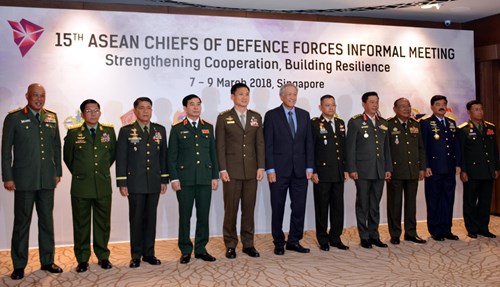Cooperation spirit of resilience, response and recovery
Addressing the ACDFIM-15, Lieutenant General Perry Lim, Chief of the Singaporean Defense Forces, warmly welcomed all the participating delegations. He stressed the significance of the event and reaffirmed Singapore’s commitments to promoting regional cooperation and building mutual trust and confidence in bilateral and multilateral relations within ASEAN cooperation mechanisms. He also expressed big concern about terrorism, which is threatening regional peace, stability and security.
To counter terrorism and other emerging challenges, the host proposed ASEAN militaries to boost cooperation in the spirit “Resilience-Response-Recovery,” increase information sharing, and organize bilateral and multilateral military exercises on anti-terrorism with the aim of preventing the rise of terrorism in the region.
At the meeting, head delegates discussed various issues within the framework of bilateral and multilateral cooperation mechanisms of ASEAN for common goals and in accordance with characteristics of each country’s military.
They underscored the need to strengthen cooperation on anti-terrorism, cyber security, maritime security, responses to natural disasters, humanitarian relief, information sharing, joint military drills and joint patrols.
The meeting determined the commitments of ASEAN countries’ militaries in dealing with regional security challenges, building confidence and mutual trust in their defense relations.
Delegates also stressed that ASEAN member nations and non-ASEAN partners should promote cooperation in response to terrorist activities using chemical, biological and radioactive weapons.
The meeting produced with a joint statement and saw a chairmanship hand-over ceremony. The ACDFIM-15 Joint Statement underlines the importance of maintaining security, stability as well as freedom and safety of navigation and overflight in the East Sea (South China Sea); the need to improve confidence and mutual trust, avoid activities that might complicate the situation, and follow peaceful solutions to disputes in line with international law, particularly the 1982 UN Convention on the Law of the Sea (UNCLOS 1982).
It also articulates that ASEAN member nations should promote defense cooperation on the basis of respect of each other’s sovereignty and territorial integrity, make decisions on the basis of unanimity, actively participate in joint activities on the voluntary basis, in accordance with the participating parties’ capacities and at a speed suitable with all participating parties, in order to build confidence and improve their capabilities to address regional security challenges in an effective and timely manner.
The document shows strong support for regional cooperation in the spirit of resilience, response and recovery to prevent terrorism and coordinate ASEAN efforts in dealing with current security challenges as well as possible terrorist attacks.
Delegates witnessed the chairmanship hand-over from Singapore to Thailand. Accordingly, Thailand will host ACDFIM-16 and other related events in 2019.
Vietnam proved to be an active and responsible member
At the meeting, Senior Lieutenant General Phan Van Giang delivered an important speech, generalizing the regional situation, predicting situational developments in the region and giving some suggestions to strengthen regional cooperation and maintain regional peace, stability and security.
    |
 |
|
Senior Lieutenant General Phan Van Giang (fourth from left) and other delegates in a group photo at the meeting |
General Giang showed his support for defense cooperation contents proposed by the host and other head delegates, underscoring that ASEAN should promote practical and effective cooperation and improve its resilience in order to build a united community and play the central role in regional security mechanisms. He suggested that ASEAN militaries should play a key and leading role in fostering the political-security ASEAN Community. He pointed out that ASEAN member countries should reach common agreement on the awareness of and responsibility for the bloc’s common security issues as well as should determine security issues of the bloc as each country’s affairs and vice versa.
To meet this end, they should coordinate closely with each other in studying, assessing the regional situation as well as predicting further situational developments; sharing information about regional security challenges; and expanding cooperation on the basis of prioritizing urgent issues and starting from simple and easy issues to more complex and difficult ones, and in the spirit of sincerity, voluntarism and responsibility.
The Vietnamese head of delegation also mentioned several concrete measures: ASEAN member countries should actively share information about the regional situation and increase joint patrols in order to prevent the rise of terrorism in the region; they should strengthen cooperation within the framework of the ADMM+ Experts’ Working Group on cyber security to maintain regional cyber security; they should show strong support for peaceful solutions to any bilateral and multilateral disputes or differences on the basis of international law, particularly UNCLOS 1982, DOC and other regional commitments while striving to complete the negotiation for a law-binding code of conduct in the East Sea (COC), in order to maintain peace, stability, security and navigation and overflight freedom in the regional seas.
He strongly advocated the proposal of Singapore to develop a code to avoid unplanned encounters in the air, similar to the available Code for Unplanned Encounters at Sea (CUES) between China and ASEAN.
On the sidelines of the ACDFIM-15, the Vietnamese head delegate had bilateral meetings with head delegates of Singapore, the Philippines and Brunei.
Reported by Phan Tung Son from Singapore
Translated by Thu Nguyen